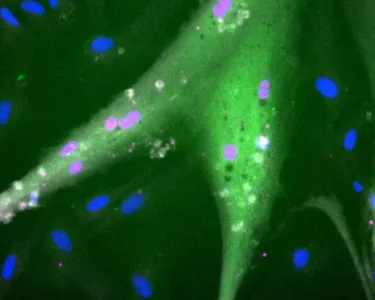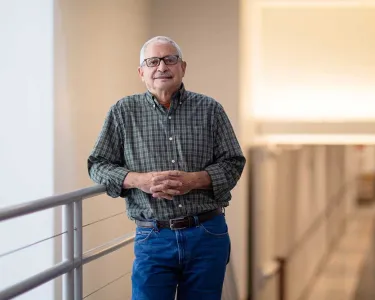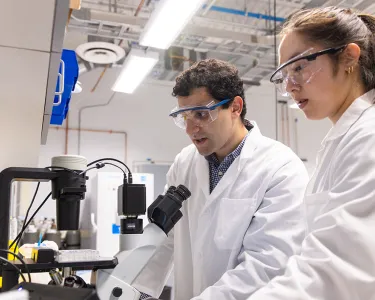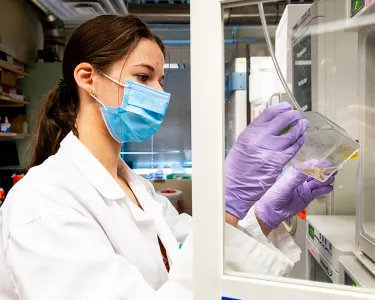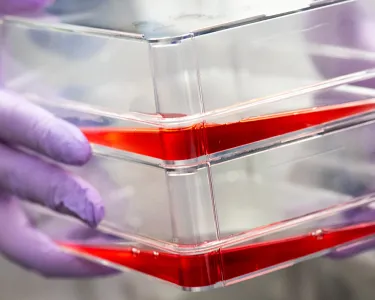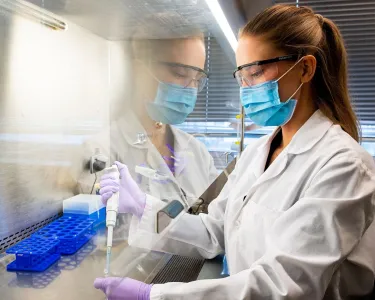Cellular Agriculture
The Tufts Center for Cellular Agriculture is overcoming fundamental technical challenges in the field, developing standards, and sharing knowledge that will change how we eat.
Developing the Food of the Future
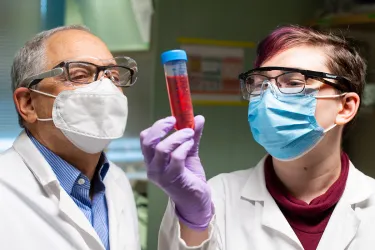
A nascent industry with the potential to feed billions of people—sustainably—cellular agriculture involves creating meat products from the growth of cells in bioreactors. The process results in the production of nutritious and safe foods while reducing environmental impact and resource usage.
David Kaplan, the Stern Family Professor of Engineering at Tufts, is the field’s leading expert. Along with researchers in his lab, he has devised novel means of approximating the characteristics of actual meat through tissue engineering, using concepts such as mechanical tension and micropatterned substrates to help align cells into fibers.
As a thought leader and industry visionary, Kaplan regularly convenes researchers, business leaders, educators, and others to explore developments and possibilities in sustainably created food. He also leads our annual Cellular Agriculture Innovation Day, giving dozens of stakeholders the opportunity to come together and define the evolution of the field.
Tufts has received significant federal support as well as individual philanthropy to advance our pioneering work in cellular agriculture. At the Tufts University Center for Cellular Agriculture (TUCCA), we’ve built a Tufts-led consortium of companies and nonprofit organizations from around the world, seeking input from consortium members on research projects to be funded and sharing early access to the technology and knowledge that comes out of those projects.
Current areas of focus include interdisciplinary approaches to evaluating consumer acceptance of cultivated meat, measuring the environmental impact of the manufacturing process, assessing economic viability, and preparing the next generation of the industry’s workforce.
In addition, researchers continue to advance methods for creating foods that replicate the sensory qualities—smell, taste, feel, and texture—of traditional meat products. A team of graduate students, led by Kaplan, carries out this cutting-edge work, as the undergraduates in our cellular agriculture minor—the first in the world—prepare to contribute to the field and this industry in the future.
Cellular Agriculture Statistics
$ 10 M
Grant from the U.S. Department of Agriculture to develop cultivated meat
9
Founding companies and nonprofits in the Tufts Center for Cellular Agriculture consortium
2
Number of graduate certificate programs and undergraduate minors in cellular agriculture in the U.S.—both at Tufts
9.7 B
The world's population by 2050, requiring 2x the amount of animal protein we currently consume
Selected Research
Cellular Agriculture Resources
-
Friedman School of Nutrition Science and Policy
The Friedman School offers nutrition innovation, consumer acceptance, and life-cycle assessments in the cellular agriculture space.
-
Resource Center for Tissue Engineering
Housed within the School of Engineering's Biomedical Engineering Department and supported by the NIH, this resource center offers expertise in the foundations of cellular agriculture.
-
Cummings School of Veterinary Medicine
Cummings School faculty provide livestock-and research-related expertise from the university's campus in Grafton, Massachusetts.
-
Courses in Cellular Agriculture
For broad audience accessibility, Tufts University Center for Cellular Agriculture offers both online and in-person courses.
